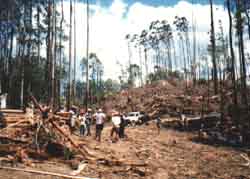Timber Industry Double Talk
Often when environmentalists and timber workers get involved in
a debate or discussion over forest logging, the discussion becomes
a frustrating argument about who has the correct facts. Both sides
usually end up accusing the other side of telling lies or having
incorrect and uninformed information.
For the general public, trying to know whom to
believe can be confusing. To help solve this problem, it is important
to remember that the timber industry bases its facts and arguments
on the beliefs, aspirations and views held by people associated
with the timber industry, and consequently reflect the timber
industry vision for native forests. They are behaving as tree
farmers.
The environment movement naturally has its own
vision, and hence when discussing forest issues the focus needs
to be on what the difference are between the visions and who fact
support these differences. The community values of water, recreation,
and sustainablilty cannot be ignored.
It should be clear to most environmentalists that
the timber industry vision is one of continued ruthless exploitation
of native forests. To make this vision and current reality more
acceptable to the general public, the timber industry has cleverly
been able to manipulate the use of language to trick people into
thinking that their commercial perspective is the only one.
To be able to expose this commercial vision relative
to the environmentalist vision, the following points highlight
some of the distorted concepts that are used by people within
the timber industry.
the Myth: Trees are only Logs
In fact logs are, or were living trees. An environmentalist could
argue all day with a tree feller on this point and get nowhere.
Both, however are correct, it depends on your point of view. The
community interest is not necessatily either perspective, but
it is public not private property.
the Myth: Only waste wood / residual timber
is woodchipped
Waste wood / residual timber is any tree as well as saw log off
cut that will not meet sawlog grade. In some cases 100% of trees
in a coup can be too small or twisted to meet sawlog grade. The
industrial perspective views such forest as waste forest and of
no use except for wood chipping. The very concept of using the
word waste reduces the debate to only economic considerations.
the Myth: The forests are harvested
This implies controlling planting and management has gone on and
we are now about to "harvest" our "crop". Nearly 100% of sawn
timber in the Orbost sawmills from East Gippsland is coming from
virgin old growth forests. Old growth forest was never planted
by humans and has existed in its own right without human intervention.
A more accurate perspective would be, the natural forests are
being cut down and replaced with modified environment. Trees are
harvested, ecology is obliterated.
the Myth: Forest Regenerate
The concept that forests regenerate after logging, is widely used
by industry spokes people. The use of the word regenerate, imply
the forests return to their original state after logging is finished.
This has the effect of deceiving the public into believing nothing
is being lost.
The fact is that the timber industry is clear felling
on a 50 to 80 year cycle, while some areas what it is logging
is over 250 years old. A eucalypt forest has a life cycle of around
400 years. In human terms we will be logging forest when they
are only 13 to 20 years of age and never allowing them to even
reach their 21st birthday let alone middle or even old age.
The structural diversity of a forest is greatly
simplified and the habitat values are greatly reduced with the
loss of many hollow baring trees. Further more a number of scientific
studies have clearly show their is a change in the type of species
present.
The use of percentage can be deceiving. The industry
may claim that 80% of old growth is protected in National Parks.
This sounds good, however in reality this percentage is always
increasing as the timber industry eventually logs the remaining
20% not protected, and hence in a few years they will be able
to claim that 100% of old growth is protected in national parks
as they will have destroyed all the rest outside.
Forestry Workers Manage the Forests
Forestry workers in the Department of Natural Resources and Environment
often describe themselves as being involved in forest management
which means manipulating forest ecology into plantations. These
foresters should really by called plantation creators. Their word
includes building and maintaining logging roads, supervising clearfelling
and crop planting of new tree in coupes.
Forestry mimics natural processes such
as fire
Certain scientist in the pocket of the timber industry, will imply
that logging is necessary for the regeneration of the forests,
and even that it mimics a natural process such as fire. These
scientists are referring to the regeneration of Mountain Ash (Ecalyputs
regnans) after fire. Mountain Ash require fire to regenerate
and without will eventually be replaced by rainforest (not good
if you are a logger). Mountain Ash also responds well to regeneration
burns after logging. Beech Myrtle and other rainforest species
do not regenerate from burning.
Using a form of pseudo-science they conveniently
ignore the massive damage done to the structural diversity of
the forest and the change in species composition. They make claims
which give the appearence that logging is in fact almost vital
for a healthy forest.
Return to info sheets index


